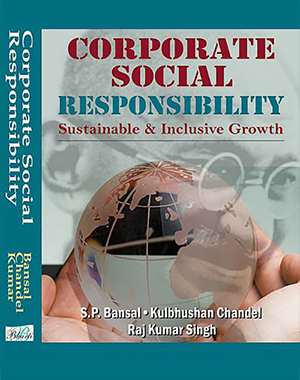
The present book has been divided into three sections. The first section deals with conceptualisation of the idea of corporate social responsibility. This section contains twenty one chapters. The main focus of this section is on Corporate Social Responsibility – Issues and Challenges, Corporate Social Responsibility and Sustainable Growth ,Corporate Social Responsibility under disguise of Sustainable Development: A Myth or a Reality, New Company Law: New dimensions of corporate social ...responsibility, Corporate Social Responsibility: A Key to strong Brand Equity, Corporate Social Responsibility in India - Issues and Challenges, CSR practices in North India, Welfare State and Corporate Social Responsibility: A Human Rights Approach, Paradoxes of Indian state & implications of C.S.R in present Neo-liberal regime and Corporate Social Responsibility and Stake Holder Approach. In the second section an effort has been made to understand CSR and Inclusive & Sustainable Development in the back drop of Gandhian Philosophy. The main focus area of this section emphasised on Understanding CSR with Gandhian perspective, Corporate Social Responsibility and Sustainable Development: A Gandhian Perspective, CSR and the Theory of Trusteeship of Gandhi, Gandhian Philosophy and corporate social responsibility and Relevance of Gandhian Philosophy in CSR for Inclusive Growth. The third section of this book deals with various other issues such as Corporate Governance, Business Ethics etc. The focus area is confined to the issues relating to; Corporate Environment Reporting: A Conceptual Analysis, Special Economic Zones, its utility and Corporate Social Responsibility, Good Corporate Governance & Ethics: Developing a Market for Morality and Corporate Governance through Audit Committees.